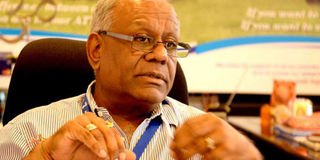Taxpayers’ money should not be used to bail out Nakumatt

Nakumatt Managing Director Atul Shah speaks during an interview with Business Daily at his office in Nairobi on May 28, 2015. No taxpayer money should be pumped into Nakumatt until we know how billions belonging to its suppliers have disappeared. PHOTO | NATION MEDIA GROUP
What you need to know:
- For a chain of its size, it was found that the company only produced management accounts on a quarterly basis.
- According the statistics, Nakumatt has an annual turnover of Sh50 billion. It owes suppliers 20.5 billion.
I have it on authority that the government is seriously considering bailing out the troubled Nakumatt Supermarket chain.
Is it the right thing to do? Let’s start by theory. Governments usually move in to save companies under the following conditions:
First, where the asset is fully or partially owned by the State. The objective in such cases is to protect public assets from loss.
Secondly, and especially, after the bailouts we saw in America and Europe following the 2008 global financial crisis, governments can move in to rescue private companies, when they are considered as ‘systemic’-in other words, when it is deemed that the death of an enterprise is likely to hurt the macro economy in terms of job losses, tax revenue - and where the turnover is materially significant to the health of a critical sector.
TRANSPARENCY
Thirdly, the State can intervene on the grounds of interconnectedness or when the troubled firm has such a significant ecosystem that its collapse is likely to have an adverse impact on other enterprises.
There are many other reasons why governments bail out troubled firms.
What I mention here are examples I consider relevant to the reported plans to rescue Nakumatt.
In my view, no taxpayer money should be pumped into Nakumatt until we know how billions belonging to its suppliers have disappeared.
I say so because the model for a supermarket chain like Nakumatt is a very basic sale of goods on credit transaction: You take someone’s goods, sell them for cash and pay the supplier in 30 days.
DISCLOSURE
Most of the goods in the store will be on consignment where liability is only recognised at the point when the goods are sold for cash.
The supermarket only provides the shelves and space.
Large supermarkets such as Nakumatt don’t own or put up buildings.
Even the shelves and the ICT infrastructure, including the cash till, is on lease.
The problem with intervening in the Nakumatt issue is that it means dealing with a very opaque institution.
Even a basic thing such as ownership of the company is very hard to determine.
FINANCIAL MANAGEMENT
Recently, I came across very reliable and documented information that shows that the main shareholder, Mr Atul Shah, in 2016 bought out the minority shareholder, an entity by the name Hotnet Ltd for $7 million.
As per the shareholders agreement with Hotnet, a firm associated with Mr Harun Mwau and which owned 3.23 per cent of the company, the consideration was to be made in deferred payments.
As at July this year, Hotnet had not been paid. Technically, Mr Mwau is still in play.
The document I have seen - compiled by a leading accounting firm - also makes interesting observations about Nakumatt’s state of financial management.
INVENTORY
First, the analysts found no accounting system in place to produce reliable financial data.
For a chain of its size, it was found that the company only produced management accounts on a quarterly basis.
Although Nakumatt had an end-to-end ERP (Oracle) system, it was not deployed to full potential.
Third, the firm had an inventory control system that was more or less dysfunctional.
Liability to creditors was understated by Sh3 billion.
The most pertinent question in the saga: Where did the money that suppliers entrusted with Nakumatt disappear?
CREDIT PERIOD
There is statistic in the report I mention that suggests an answer.
The length of the average credit period had moved from 75 per cent, well beyond the normal period of 30 days, to 196 days between 2014 and 2017.
This means that if you supplied in January, you were not paid until June.
It is a classic case of abuse of market power.
By manipulating the average credit period, a perfect environment was created the chain to lay games.
According the statistics, Nakumatt has an annual turnover of Sh50 billion. It owes suppliers 20.5 billion.
STRATEGIC INVESTOR
The lenders are owed Sh13.2 billion, including Sh5.5 billion owed to holders of commercial paper.
Since all sales were made in cash, where did the money go?
If the government for any reason decides to intervene in Nakumatt, it must follow the playbook employed by the Americans and the British during the 2008 crisis that runs as follows:
First, assume majority control by paying the current shareholder a nominal figure of say- $1.
AUDIT
Secondly, toss out directors and management and bring in a strategic investor.
Finally, start bringing down your stake in the firm by selling your shares progressively through the Nairobi Securities Exchange and as the business recovers.
Above all, let the government order a forensic audit to tell us where the billions belonging to suppliers and lenders disappeared.





